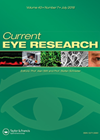
Journal Reviews
The effect of caffeine on pupil size and accommodation
Twenty-two young and healthy participants were recruited in this study. The authors showed that pupil size increased as a result of caffeine consumption. A more stable (lower variability of accommodation) accommodative response (AR) was induced by caffeine intake, whereas the...





